International Political Economy: Resource Curse and Its Impact Essay
VerifiedAdded on 2023/04/08
|14
|3676
|224
Essay
AI Summary
This essay examines the concept of the resource curse within the framework of international political economy, arguing that the abundance of natural resources can paradoxically harm states. The essay explores how resource wealth, particularly in oil and diamonds, has led to economic stagnation, corruption, and political instability in countries like Nigeria, Sierra Leone, and Russia. It discusses the Dutch Disease, where reliance on natural resource exports harms other sectors, and analyzes how oil revenues have fueled conflicts, weakened democratic institutions, and exacerbated poverty. The essay highlights cases like the Niger Delta, where oil extraction has led to violence and environmental degradation, and Sierra Leone, where diamonds fueled a civil war. Furthermore, it examines how resource wealth in Russia has been associated with the erosion of civil liberties and democratic governance. The analysis demonstrates how weak governance structures and corruption often accompany resource wealth, leading to negative outcomes for citizens and undermining sustainable development.
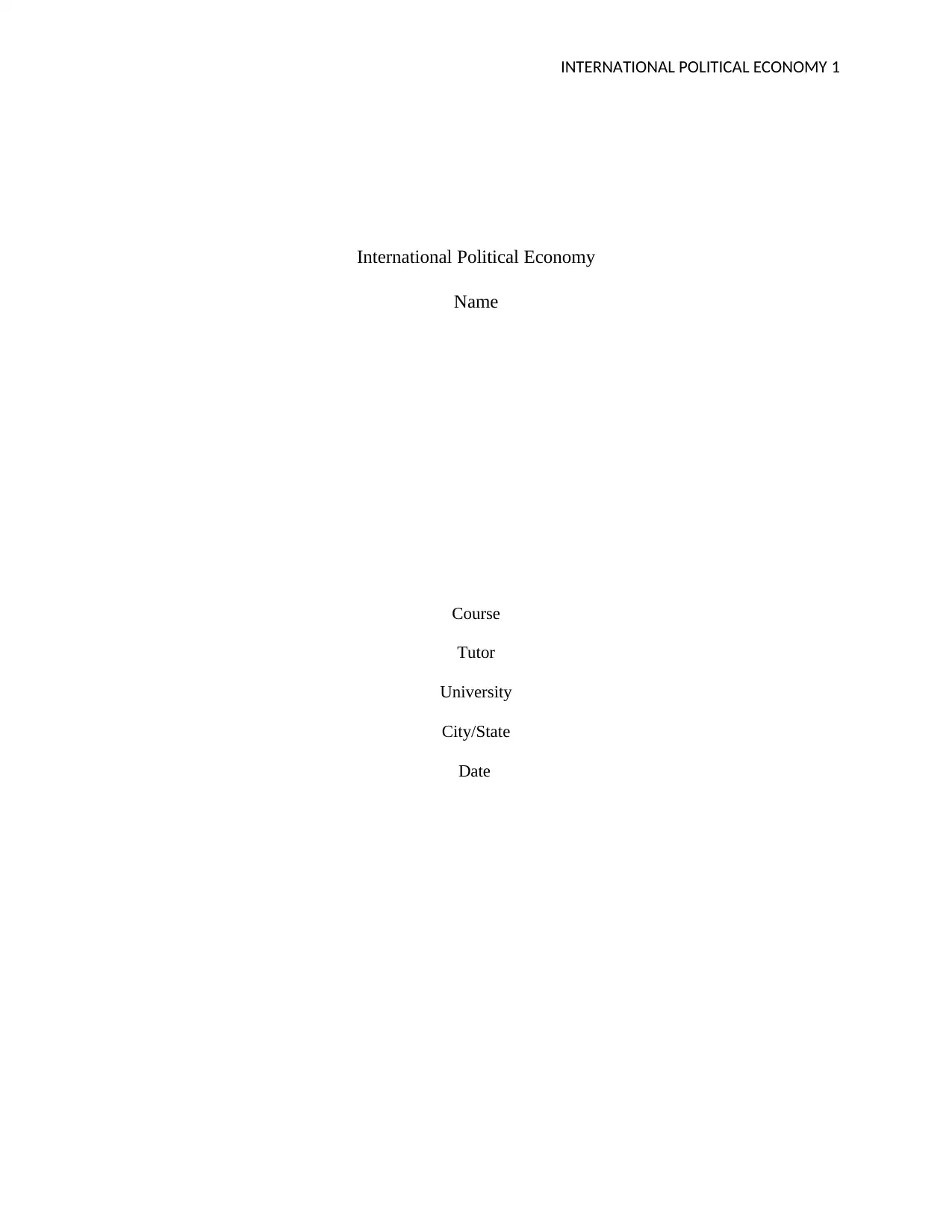
INTERNATIONAL POLITICAL ECONOMY 1
International Political Economy
Name
Course
Tutor
University
City/State
Date
International Political Economy
Name
Course
Tutor
University
City/State
Date
Paraphrase This Document
Need a fresh take? Get an instant paraphrase of this document with our AI Paraphraser
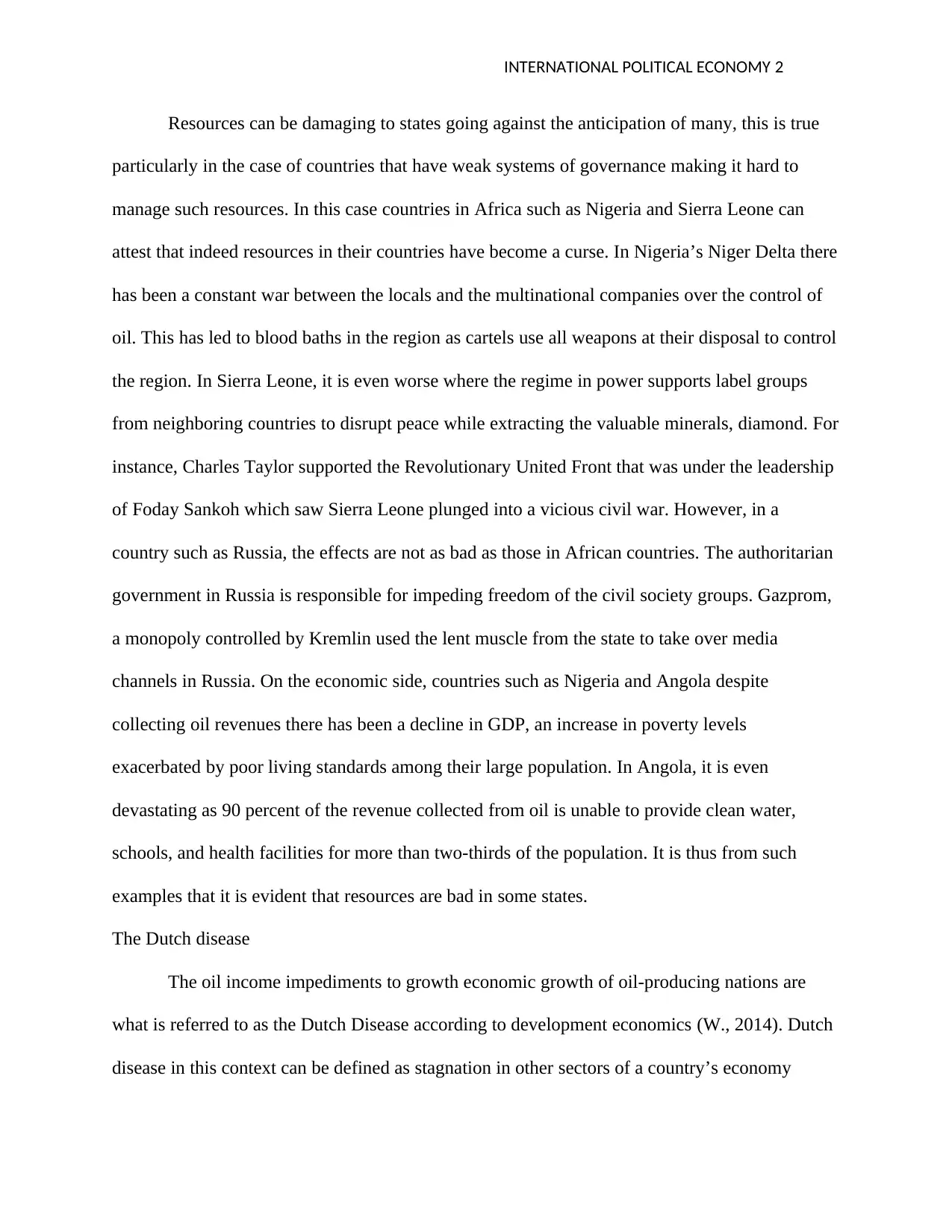
INTERNATIONAL POLITICAL ECONOMY 2
Resources can be damaging to states going against the anticipation of many, this is true
particularly in the case of countries that have weak systems of governance making it hard to
manage such resources. In this case countries in Africa such as Nigeria and Sierra Leone can
attest that indeed resources in their countries have become a curse. In Nigeria’s Niger Delta there
has been a constant war between the locals and the multinational companies over the control of
oil. This has led to blood baths in the region as cartels use all weapons at their disposal to control
the region. In Sierra Leone, it is even worse where the regime in power supports label groups
from neighboring countries to disrupt peace while extracting the valuable minerals, diamond. For
instance, Charles Taylor supported the Revolutionary United Front that was under the leadership
of Foday Sankoh which saw Sierra Leone plunged into a vicious civil war. However, in a
country such as Russia, the effects are not as bad as those in African countries. The authoritarian
government in Russia is responsible for impeding freedom of the civil society groups. Gazprom,
a monopoly controlled by Kremlin used the lent muscle from the state to take over media
channels in Russia. On the economic side, countries such as Nigeria and Angola despite
collecting oil revenues there has been a decline in GDP, an increase in poverty levels
exacerbated by poor living standards among their large population. In Angola, it is even
devastating as 90 percent of the revenue collected from oil is unable to provide clean water,
schools, and health facilities for more than two-thirds of the population. It is thus from such
examples that it is evident that resources are bad in some states.
The Dutch disease
The oil income impediments to growth economic growth of oil-producing nations are
what is referred to as the Dutch Disease according to development economics (W., 2014). Dutch
disease in this context can be defined as stagnation in other sectors of a country’s economy
Resources can be damaging to states going against the anticipation of many, this is true
particularly in the case of countries that have weak systems of governance making it hard to
manage such resources. In this case countries in Africa such as Nigeria and Sierra Leone can
attest that indeed resources in their countries have become a curse. In Nigeria’s Niger Delta there
has been a constant war between the locals and the multinational companies over the control of
oil. This has led to blood baths in the region as cartels use all weapons at their disposal to control
the region. In Sierra Leone, it is even worse where the regime in power supports label groups
from neighboring countries to disrupt peace while extracting the valuable minerals, diamond. For
instance, Charles Taylor supported the Revolutionary United Front that was under the leadership
of Foday Sankoh which saw Sierra Leone plunged into a vicious civil war. However, in a
country such as Russia, the effects are not as bad as those in African countries. The authoritarian
government in Russia is responsible for impeding freedom of the civil society groups. Gazprom,
a monopoly controlled by Kremlin used the lent muscle from the state to take over media
channels in Russia. On the economic side, countries such as Nigeria and Angola despite
collecting oil revenues there has been a decline in GDP, an increase in poverty levels
exacerbated by poor living standards among their large population. In Angola, it is even
devastating as 90 percent of the revenue collected from oil is unable to provide clean water,
schools, and health facilities for more than two-thirds of the population. It is thus from such
examples that it is evident that resources are bad in some states.
The Dutch disease
The oil income impediments to growth economic growth of oil-producing nations are
what is referred to as the Dutch Disease according to development economics (W., 2014). Dutch
disease in this context can be defined as stagnation in other sectors of a country’s economy
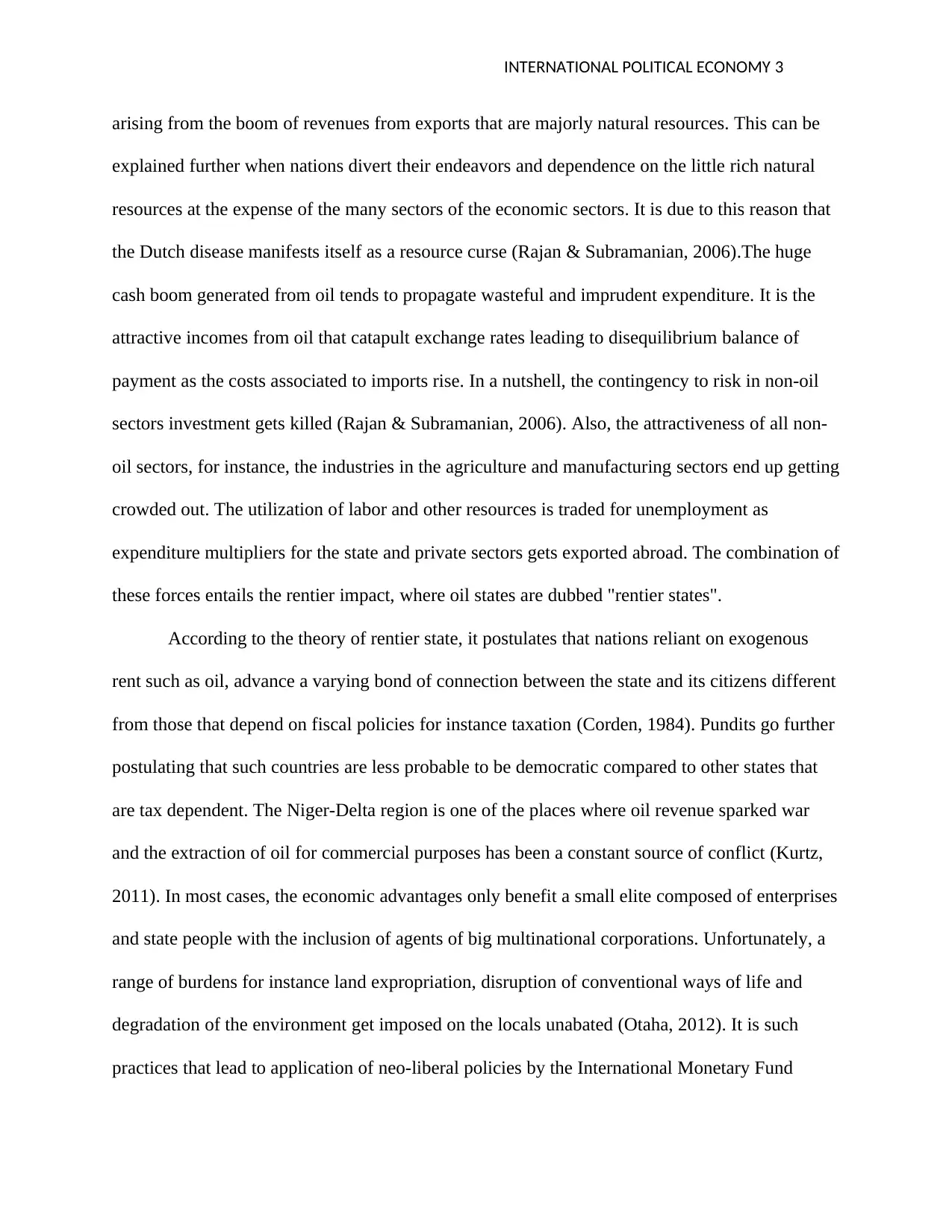
INTERNATIONAL POLITICAL ECONOMY 3
arising from the boom of revenues from exports that are majorly natural resources. This can be
explained further when nations divert their endeavors and dependence on the little rich natural
resources at the expense of the many sectors of the economic sectors. It is due to this reason that
the Dutch disease manifests itself as a resource curse (Rajan & Subramanian, 2006).The huge
cash boom generated from oil tends to propagate wasteful and imprudent expenditure. It is the
attractive incomes from oil that catapult exchange rates leading to disequilibrium balance of
payment as the costs associated to imports rise. In a nutshell, the contingency to risk in non-oil
sectors investment gets killed (Rajan & Subramanian, 2006). Also, the attractiveness of all non-
oil sectors, for instance, the industries in the agriculture and manufacturing sectors end up getting
crowded out. The utilization of labor and other resources is traded for unemployment as
expenditure multipliers for the state and private sectors gets exported abroad. The combination of
these forces entails the rentier impact, where oil states are dubbed "rentier states".
According to the theory of rentier state, it postulates that nations reliant on exogenous
rent such as oil, advance a varying bond of connection between the state and its citizens different
from those that depend on fiscal policies for instance taxation (Corden, 1984). Pundits go further
postulating that such countries are less probable to be democratic compared to other states that
are tax dependent. The Niger-Delta region is one of the places where oil revenue sparked war
and the extraction of oil for commercial purposes has been a constant source of conflict (Kurtz,
2011). In most cases, the economic advantages only benefit a small elite composed of enterprises
and state people with the inclusion of agents of big multinational corporations. Unfortunately, a
range of burdens for instance land expropriation, disruption of conventional ways of life and
degradation of the environment get imposed on the locals unabated (Otaha, 2012). It is such
practices that lead to application of neo-liberal policies by the International Monetary Fund
arising from the boom of revenues from exports that are majorly natural resources. This can be
explained further when nations divert their endeavors and dependence on the little rich natural
resources at the expense of the many sectors of the economic sectors. It is due to this reason that
the Dutch disease manifests itself as a resource curse (Rajan & Subramanian, 2006).The huge
cash boom generated from oil tends to propagate wasteful and imprudent expenditure. It is the
attractive incomes from oil that catapult exchange rates leading to disequilibrium balance of
payment as the costs associated to imports rise. In a nutshell, the contingency to risk in non-oil
sectors investment gets killed (Rajan & Subramanian, 2006). Also, the attractiveness of all non-
oil sectors, for instance, the industries in the agriculture and manufacturing sectors end up getting
crowded out. The utilization of labor and other resources is traded for unemployment as
expenditure multipliers for the state and private sectors gets exported abroad. The combination of
these forces entails the rentier impact, where oil states are dubbed "rentier states".
According to the theory of rentier state, it postulates that nations reliant on exogenous
rent such as oil, advance a varying bond of connection between the state and its citizens different
from those that depend on fiscal policies for instance taxation (Corden, 1984). Pundits go further
postulating that such countries are less probable to be democratic compared to other states that
are tax dependent. The Niger-Delta region is one of the places where oil revenue sparked war
and the extraction of oil for commercial purposes has been a constant source of conflict (Kurtz,
2011). In most cases, the economic advantages only benefit a small elite composed of enterprises
and state people with the inclusion of agents of big multinational corporations. Unfortunately, a
range of burdens for instance land expropriation, disruption of conventional ways of life and
degradation of the environment get imposed on the locals unabated (Otaha, 2012). It is such
practices that lead to application of neo-liberal policies by the International Monetary Fund
⊘ This is a preview!⊘
Do you want full access?
Subscribe today to unlock all pages.

Trusted by 1+ million students worldwide
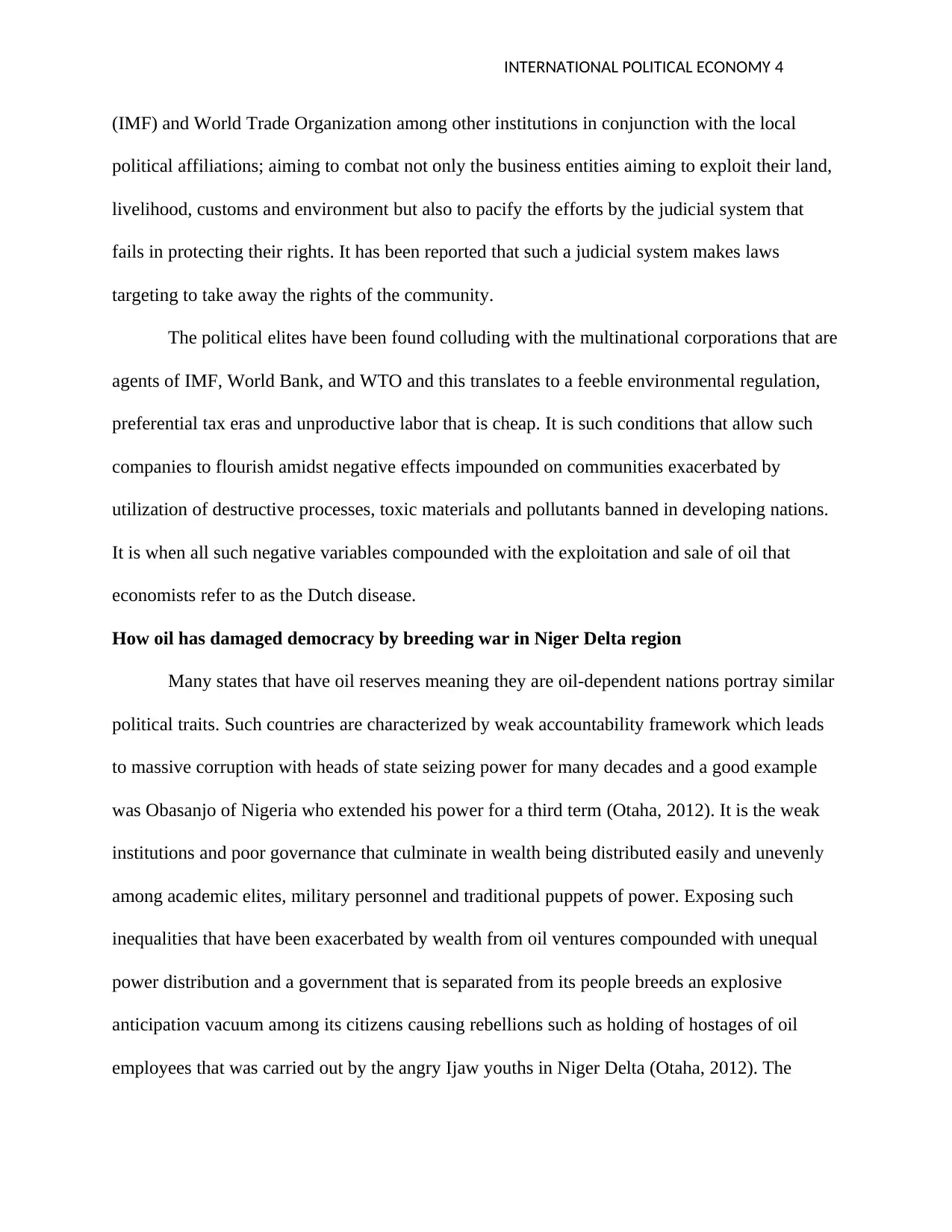
INTERNATIONAL POLITICAL ECONOMY 4
(IMF) and World Trade Organization among other institutions in conjunction with the local
political affiliations; aiming to combat not only the business entities aiming to exploit their land,
livelihood, customs and environment but also to pacify the efforts by the judicial system that
fails in protecting their rights. It has been reported that such a judicial system makes laws
targeting to take away the rights of the community.
The political elites have been found colluding with the multinational corporations that are
agents of IMF, World Bank, and WTO and this translates to a feeble environmental regulation,
preferential tax eras and unproductive labor that is cheap. It is such conditions that allow such
companies to flourish amidst negative effects impounded on communities exacerbated by
utilization of destructive processes, toxic materials and pollutants banned in developing nations.
It is when all such negative variables compounded with the exploitation and sale of oil that
economists refer to as the Dutch disease.
How oil has damaged democracy by breeding war in Niger Delta region
Many states that have oil reserves meaning they are oil-dependent nations portray similar
political traits. Such countries are characterized by weak accountability framework which leads
to massive corruption with heads of state seizing power for many decades and a good example
was Obasanjo of Nigeria who extended his power for a third term (Otaha, 2012). It is the weak
institutions and poor governance that culminate in wealth being distributed easily and unevenly
among academic elites, military personnel and traditional puppets of power. Exposing such
inequalities that have been exacerbated by wealth from oil ventures compounded with unequal
power distribution and a government that is separated from its people breeds an explosive
anticipation vacuum among its citizens causing rebellions such as holding of hostages of oil
employees that was carried out by the angry Ijaw youths in Niger Delta (Otaha, 2012). The
(IMF) and World Trade Organization among other institutions in conjunction with the local
political affiliations; aiming to combat not only the business entities aiming to exploit their land,
livelihood, customs and environment but also to pacify the efforts by the judicial system that
fails in protecting their rights. It has been reported that such a judicial system makes laws
targeting to take away the rights of the community.
The political elites have been found colluding with the multinational corporations that are
agents of IMF, World Bank, and WTO and this translates to a feeble environmental regulation,
preferential tax eras and unproductive labor that is cheap. It is such conditions that allow such
companies to flourish amidst negative effects impounded on communities exacerbated by
utilization of destructive processes, toxic materials and pollutants banned in developing nations.
It is when all such negative variables compounded with the exploitation and sale of oil that
economists refer to as the Dutch disease.
How oil has damaged democracy by breeding war in Niger Delta region
Many states that have oil reserves meaning they are oil-dependent nations portray similar
political traits. Such countries are characterized by weak accountability framework which leads
to massive corruption with heads of state seizing power for many decades and a good example
was Obasanjo of Nigeria who extended his power for a third term (Otaha, 2012). It is the weak
institutions and poor governance that culminate in wealth being distributed easily and unevenly
among academic elites, military personnel and traditional puppets of power. Exposing such
inequalities that have been exacerbated by wealth from oil ventures compounded with unequal
power distribution and a government that is separated from its people breeds an explosive
anticipation vacuum among its citizens causing rebellions such as holding of hostages of oil
employees that was carried out by the angry Ijaw youths in Niger Delta (Otaha, 2012). The
Paraphrase This Document
Need a fresh take? Get an instant paraphrase of this document with our AI Paraphraser
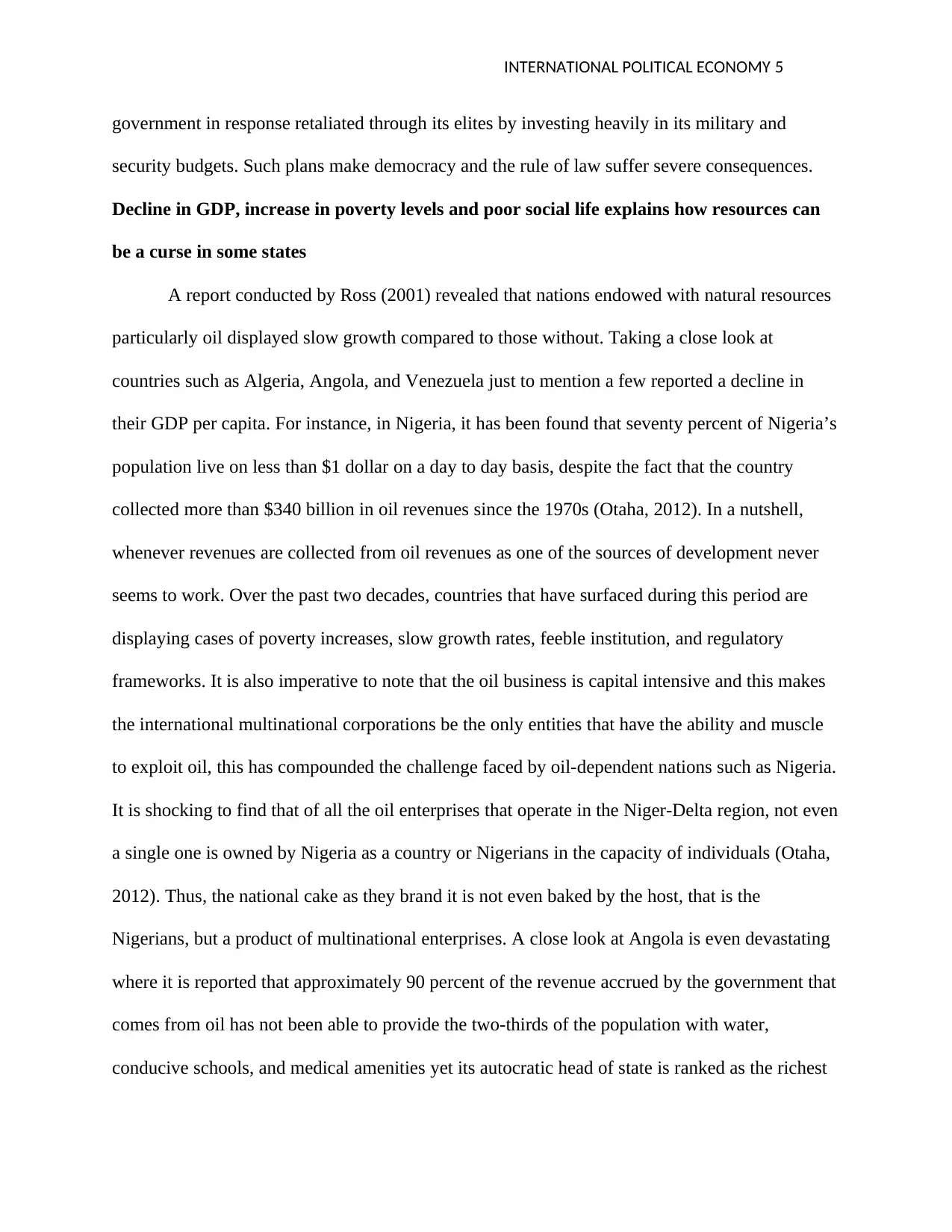
INTERNATIONAL POLITICAL ECONOMY 5
government in response retaliated through its elites by investing heavily in its military and
security budgets. Such plans make democracy and the rule of law suffer severe consequences.
Decline in GDP, increase in poverty levels and poor social life explains how resources can
be a curse in some states
A report conducted by Ross (2001) revealed that nations endowed with natural resources
particularly oil displayed slow growth compared to those without. Taking a close look at
countries such as Algeria, Angola, and Venezuela just to mention a few reported a decline in
their GDP per capita. For instance, in Nigeria, it has been found that seventy percent of Nigeria’s
population live on less than $1 dollar on a day to day basis, despite the fact that the country
collected more than $340 billion in oil revenues since the 1970s (Otaha, 2012). In a nutshell,
whenever revenues are collected from oil revenues as one of the sources of development never
seems to work. Over the past two decades, countries that have surfaced during this period are
displaying cases of poverty increases, slow growth rates, feeble institution, and regulatory
frameworks. It is also imperative to note that the oil business is capital intensive and this makes
the international multinational corporations be the only entities that have the ability and muscle
to exploit oil, this has compounded the challenge faced by oil-dependent nations such as Nigeria.
It is shocking to find that of all the oil enterprises that operate in the Niger-Delta region, not even
a single one is owned by Nigeria as a country or Nigerians in the capacity of individuals (Otaha,
2012). Thus, the national cake as they brand it is not even baked by the host, that is the
Nigerians, but a product of multinational enterprises. A close look at Angola is even devastating
where it is reported that approximately 90 percent of the revenue accrued by the government that
comes from oil has not been able to provide the two-thirds of the population with water,
conducive schools, and medical amenities yet its autocratic head of state is ranked as the richest
government in response retaliated through its elites by investing heavily in its military and
security budgets. Such plans make democracy and the rule of law suffer severe consequences.
Decline in GDP, increase in poverty levels and poor social life explains how resources can
be a curse in some states
A report conducted by Ross (2001) revealed that nations endowed with natural resources
particularly oil displayed slow growth compared to those without. Taking a close look at
countries such as Algeria, Angola, and Venezuela just to mention a few reported a decline in
their GDP per capita. For instance, in Nigeria, it has been found that seventy percent of Nigeria’s
population live on less than $1 dollar on a day to day basis, despite the fact that the country
collected more than $340 billion in oil revenues since the 1970s (Otaha, 2012). In a nutshell,
whenever revenues are collected from oil revenues as one of the sources of development never
seems to work. Over the past two decades, countries that have surfaced during this period are
displaying cases of poverty increases, slow growth rates, feeble institution, and regulatory
frameworks. It is also imperative to note that the oil business is capital intensive and this makes
the international multinational corporations be the only entities that have the ability and muscle
to exploit oil, this has compounded the challenge faced by oil-dependent nations such as Nigeria.
It is shocking to find that of all the oil enterprises that operate in the Niger-Delta region, not even
a single one is owned by Nigeria as a country or Nigerians in the capacity of individuals (Otaha,
2012). Thus, the national cake as they brand it is not even baked by the host, that is the
Nigerians, but a product of multinational enterprises. A close look at Angola is even devastating
where it is reported that approximately 90 percent of the revenue accrued by the government that
comes from oil has not been able to provide the two-thirds of the population with water,
conducive schools, and medical amenities yet its autocratic head of state is ranked as the richest
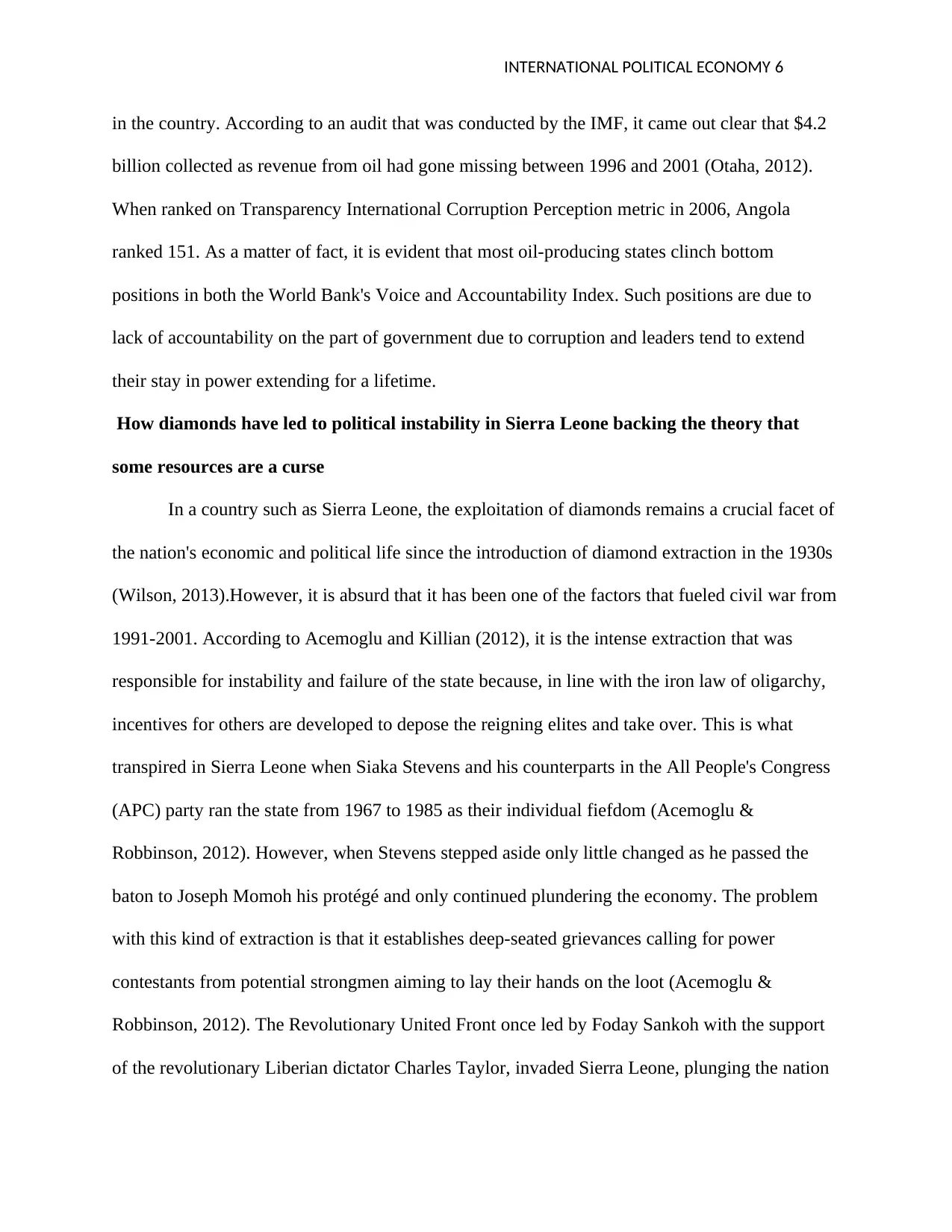
INTERNATIONAL POLITICAL ECONOMY 6
in the country. According to an audit that was conducted by the IMF, it came out clear that $4.2
billion collected as revenue from oil had gone missing between 1996 and 2001 (Otaha, 2012).
When ranked on Transparency International Corruption Perception metric in 2006, Angola
ranked 151. As a matter of fact, it is evident that most oil-producing states clinch bottom
positions in both the World Bank's Voice and Accountability Index. Such positions are due to
lack of accountability on the part of government due to corruption and leaders tend to extend
their stay in power extending for a lifetime.
How diamonds have led to political instability in Sierra Leone backing the theory that
some resources are a curse
In a country such as Sierra Leone, the exploitation of diamonds remains a crucial facet of
the nation's economic and political life since the introduction of diamond extraction in the 1930s
(Wilson, 2013).However, it is absurd that it has been one of the factors that fueled civil war from
1991-2001. According to Acemoglu and Killian (2012), it is the intense extraction that was
responsible for instability and failure of the state because, in line with the iron law of oligarchy,
incentives for others are developed to depose the reigning elites and take over. This is what
transpired in Sierra Leone when Siaka Stevens and his counterparts in the All People's Congress
(APC) party ran the state from 1967 to 1985 as their individual fiefdom (Acemoglu &
Robbinson, 2012). However, when Stevens stepped aside only little changed as he passed the
baton to Joseph Momoh his protégé and only continued plundering the economy. The problem
with this kind of extraction is that it establishes deep-seated grievances calling for power
contestants from potential strongmen aiming to lay their hands on the loot (Acemoglu &
Robbinson, 2012). The Revolutionary United Front once led by Foday Sankoh with the support
of the revolutionary Liberian dictator Charles Taylor, invaded Sierra Leone, plunging the nation
in the country. According to an audit that was conducted by the IMF, it came out clear that $4.2
billion collected as revenue from oil had gone missing between 1996 and 2001 (Otaha, 2012).
When ranked on Transparency International Corruption Perception metric in 2006, Angola
ranked 151. As a matter of fact, it is evident that most oil-producing states clinch bottom
positions in both the World Bank's Voice and Accountability Index. Such positions are due to
lack of accountability on the part of government due to corruption and leaders tend to extend
their stay in power extending for a lifetime.
How diamonds have led to political instability in Sierra Leone backing the theory that
some resources are a curse
In a country such as Sierra Leone, the exploitation of diamonds remains a crucial facet of
the nation's economic and political life since the introduction of diamond extraction in the 1930s
(Wilson, 2013).However, it is absurd that it has been one of the factors that fueled civil war from
1991-2001. According to Acemoglu and Killian (2012), it is the intense extraction that was
responsible for instability and failure of the state because, in line with the iron law of oligarchy,
incentives for others are developed to depose the reigning elites and take over. This is what
transpired in Sierra Leone when Siaka Stevens and his counterparts in the All People's Congress
(APC) party ran the state from 1967 to 1985 as their individual fiefdom (Acemoglu &
Robbinson, 2012). However, when Stevens stepped aside only little changed as he passed the
baton to Joseph Momoh his protégé and only continued plundering the economy. The problem
with this kind of extraction is that it establishes deep-seated grievances calling for power
contestants from potential strongmen aiming to lay their hands on the loot (Acemoglu &
Robbinson, 2012). The Revolutionary United Front once led by Foday Sankoh with the support
of the revolutionary Liberian dictator Charles Taylor, invaded Sierra Leone, plunging the nation
⊘ This is a preview!⊘
Do you want full access?
Subscribe today to unlock all pages.

Trusted by 1+ million students worldwide
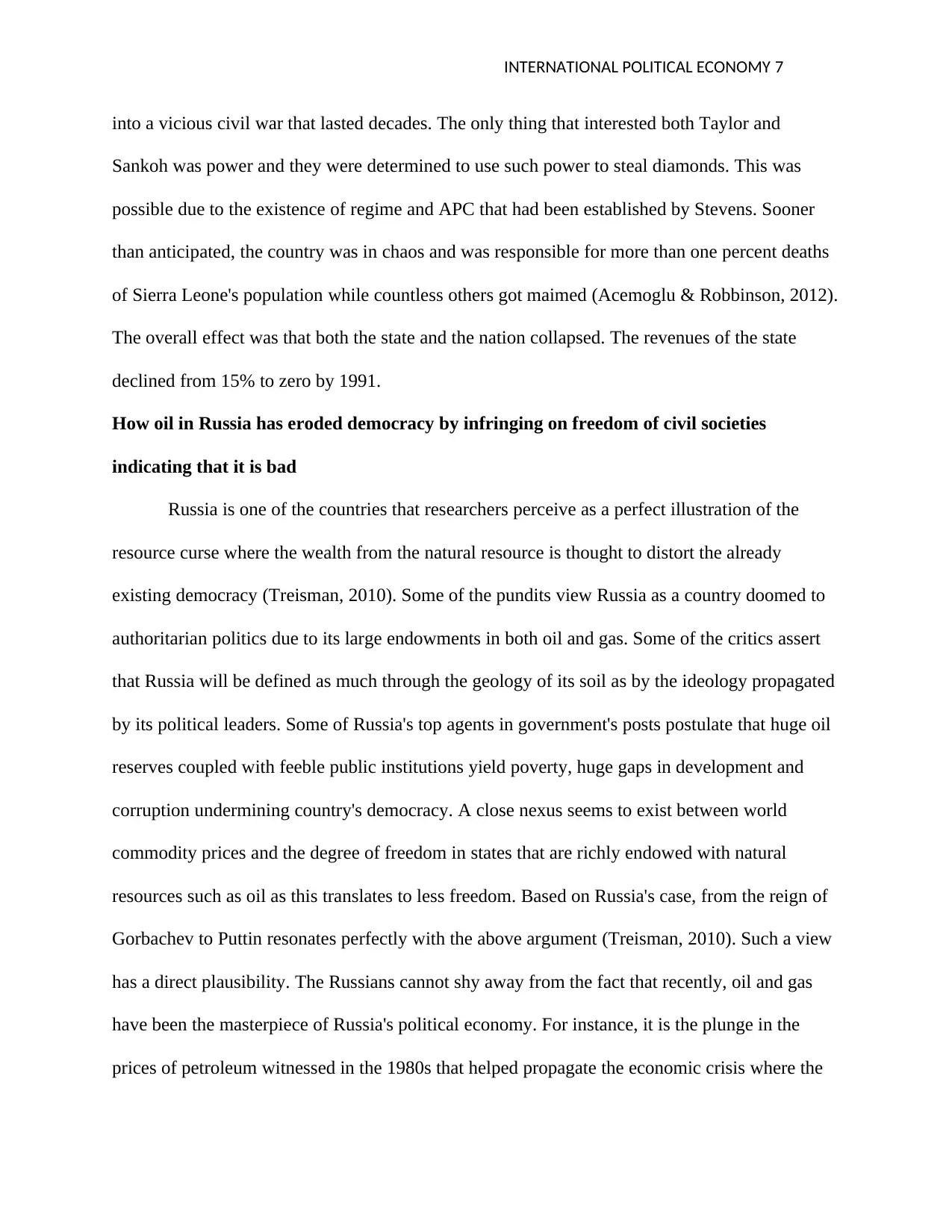
INTERNATIONAL POLITICAL ECONOMY 7
into a vicious civil war that lasted decades. The only thing that interested both Taylor and
Sankoh was power and they were determined to use such power to steal diamonds. This was
possible due to the existence of regime and APC that had been established by Stevens. Sooner
than anticipated, the country was in chaos and was responsible for more than one percent deaths
of Sierra Leone's population while countless others got maimed (Acemoglu & Robbinson, 2012).
The overall effect was that both the state and the nation collapsed. The revenues of the state
declined from 15% to zero by 1991.
How oil in Russia has eroded democracy by infringing on freedom of civil societies
indicating that it is bad
Russia is one of the countries that researchers perceive as a perfect illustration of the
resource curse where the wealth from the natural resource is thought to distort the already
existing democracy (Treisman, 2010). Some of the pundits view Russia as a country doomed to
authoritarian politics due to its large endowments in both oil and gas. Some of the critics assert
that Russia will be defined as much through the geology of its soil as by the ideology propagated
by its political leaders. Some of Russia's top agents in government's posts postulate that huge oil
reserves coupled with feeble public institutions yield poverty, huge gaps in development and
corruption undermining country's democracy. A close nexus seems to exist between world
commodity prices and the degree of freedom in states that are richly endowed with natural
resources such as oil as this translates to less freedom. Based on Russia's case, from the reign of
Gorbachev to Puttin resonates perfectly with the above argument (Treisman, 2010). Such a view
has a direct plausibility. The Russians cannot shy away from the fact that recently, oil and gas
have been the masterpiece of Russia's political economy. For instance, it is the plunge in the
prices of petroleum witnessed in the 1980s that helped propagate the economic crisis where the
into a vicious civil war that lasted decades. The only thing that interested both Taylor and
Sankoh was power and they were determined to use such power to steal diamonds. This was
possible due to the existence of regime and APC that had been established by Stevens. Sooner
than anticipated, the country was in chaos and was responsible for more than one percent deaths
of Sierra Leone's population while countless others got maimed (Acemoglu & Robbinson, 2012).
The overall effect was that both the state and the nation collapsed. The revenues of the state
declined from 15% to zero by 1991.
How oil in Russia has eroded democracy by infringing on freedom of civil societies
indicating that it is bad
Russia is one of the countries that researchers perceive as a perfect illustration of the
resource curse where the wealth from the natural resource is thought to distort the already
existing democracy (Treisman, 2010). Some of the pundits view Russia as a country doomed to
authoritarian politics due to its large endowments in both oil and gas. Some of the critics assert
that Russia will be defined as much through the geology of its soil as by the ideology propagated
by its political leaders. Some of Russia's top agents in government's posts postulate that huge oil
reserves coupled with feeble public institutions yield poverty, huge gaps in development and
corruption undermining country's democracy. A close nexus seems to exist between world
commodity prices and the degree of freedom in states that are richly endowed with natural
resources such as oil as this translates to less freedom. Based on Russia's case, from the reign of
Gorbachev to Puttin resonates perfectly with the above argument (Treisman, 2010). Such a view
has a direct plausibility. The Russians cannot shy away from the fact that recently, oil and gas
have been the masterpiece of Russia's political economy. For instance, it is the plunge in the
prices of petroleum witnessed in the 1980s that helped propagate the economic crisis where the
Paraphrase This Document
Need a fresh take? Get an instant paraphrase of this document with our AI Paraphraser
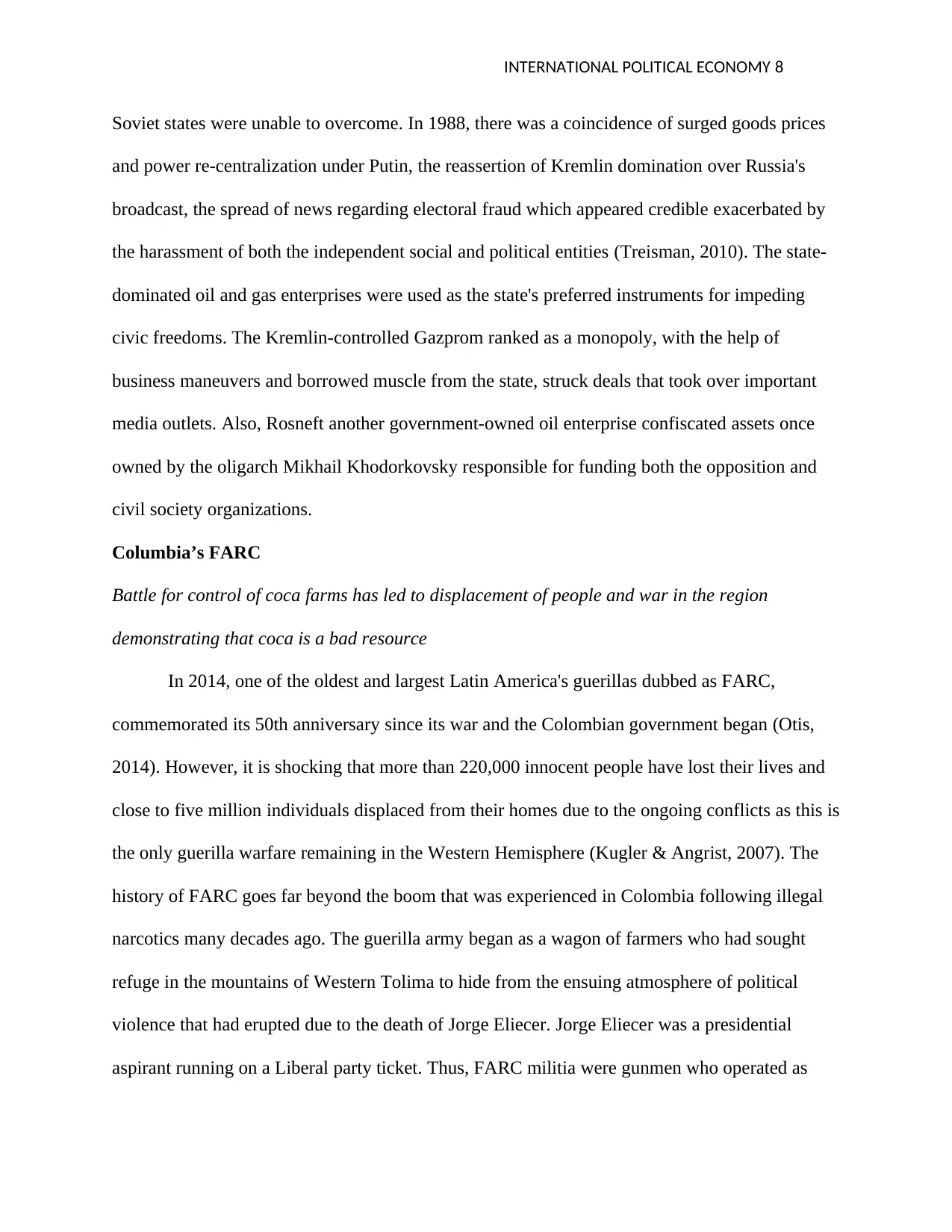
INTERNATIONAL POLITICAL ECONOMY 8
Soviet states were unable to overcome. In 1988, there was a coincidence of surged goods prices
and power re-centralization under Putin, the reassertion of Kremlin domination over Russia's
broadcast, the spread of news regarding electoral fraud which appeared credible exacerbated by
the harassment of both the independent social and political entities (Treisman, 2010). The state-
dominated oil and gas enterprises were used as the state's preferred instruments for impeding
civic freedoms. The Kremlin-controlled Gazprom ranked as a monopoly, with the help of
business maneuvers and borrowed muscle from the state, struck deals that took over important
media outlets. Also, Rosneft another government-owned oil enterprise confiscated assets once
owned by the oligarch Mikhail Khodorkovsky responsible for funding both the opposition and
civil society organizations.
Columbia’s FARC
Battle for control of coca farms has led to displacement of people and war in the region
demonstrating that coca is a bad resource
In 2014, one of the oldest and largest Latin America's guerillas dubbed as FARC,
commemorated its 50th anniversary since its war and the Colombian government began (Otis,
2014). However, it is shocking that more than 220,000 innocent people have lost their lives and
close to five million individuals displaced from their homes due to the ongoing conflicts as this is
the only guerilla warfare remaining in the Western Hemisphere (Kugler & Angrist, 2007). The
history of FARC goes far beyond the boom that was experienced in Colombia following illegal
narcotics many decades ago. The guerilla army began as a wagon of farmers who had sought
refuge in the mountains of Western Tolima to hide from the ensuing atmosphere of political
violence that had erupted due to the death of Jorge Eliecer. Jorge Eliecer was a presidential
aspirant running on a Liberal party ticket. Thus, FARC militia were gunmen who operated as
Soviet states were unable to overcome. In 1988, there was a coincidence of surged goods prices
and power re-centralization under Putin, the reassertion of Kremlin domination over Russia's
broadcast, the spread of news regarding electoral fraud which appeared credible exacerbated by
the harassment of both the independent social and political entities (Treisman, 2010). The state-
dominated oil and gas enterprises were used as the state's preferred instruments for impeding
civic freedoms. The Kremlin-controlled Gazprom ranked as a monopoly, with the help of
business maneuvers and borrowed muscle from the state, struck deals that took over important
media outlets. Also, Rosneft another government-owned oil enterprise confiscated assets once
owned by the oligarch Mikhail Khodorkovsky responsible for funding both the opposition and
civil society organizations.
Columbia’s FARC
Battle for control of coca farms has led to displacement of people and war in the region
demonstrating that coca is a bad resource
In 2014, one of the oldest and largest Latin America's guerillas dubbed as FARC,
commemorated its 50th anniversary since its war and the Colombian government began (Otis,
2014). However, it is shocking that more than 220,000 innocent people have lost their lives and
close to five million individuals displaced from their homes due to the ongoing conflicts as this is
the only guerilla warfare remaining in the Western Hemisphere (Kugler & Angrist, 2007). The
history of FARC goes far beyond the boom that was experienced in Colombia following illegal
narcotics many decades ago. The guerilla army began as a wagon of farmers who had sought
refuge in the mountains of Western Tolima to hide from the ensuing atmosphere of political
violence that had erupted due to the death of Jorge Eliecer. Jorge Eliecer was a presidential
aspirant running on a Liberal party ticket. Thus, FARC militia were gunmen who operated as
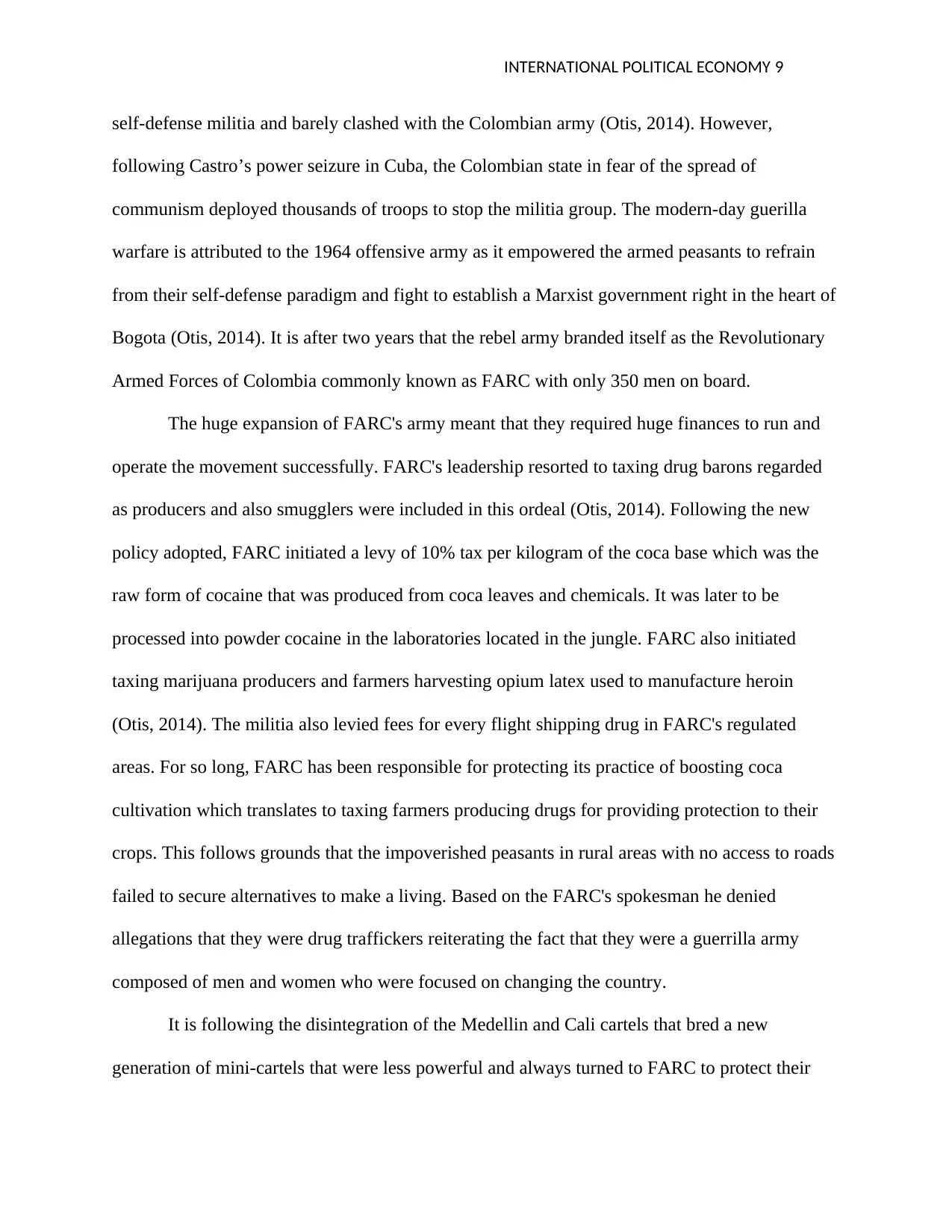
INTERNATIONAL POLITICAL ECONOMY 9
self-defense militia and barely clashed with the Colombian army (Otis, 2014). However,
following Castro’s power seizure in Cuba, the Colombian state in fear of the spread of
communism deployed thousands of troops to stop the militia group. The modern-day guerilla
warfare is attributed to the 1964 offensive army as it empowered the armed peasants to refrain
from their self-defense paradigm and fight to establish a Marxist government right in the heart of
Bogota (Otis, 2014). It is after two years that the rebel army branded itself as the Revolutionary
Armed Forces of Colombia commonly known as FARC with only 350 men on board.
The huge expansion of FARC's army meant that they required huge finances to run and
operate the movement successfully. FARC's leadership resorted to taxing drug barons regarded
as producers and also smugglers were included in this ordeal (Otis, 2014). Following the new
policy adopted, FARC initiated a levy of 10% tax per kilogram of the coca base which was the
raw form of cocaine that was produced from coca leaves and chemicals. It was later to be
processed into powder cocaine in the laboratories located in the jungle. FARC also initiated
taxing marijuana producers and farmers harvesting opium latex used to manufacture heroin
(Otis, 2014). The militia also levied fees for every flight shipping drug in FARC's regulated
areas. For so long, FARC has been responsible for protecting its practice of boosting coca
cultivation which translates to taxing farmers producing drugs for providing protection to their
crops. This follows grounds that the impoverished peasants in rural areas with no access to roads
failed to secure alternatives to make a living. Based on the FARC's spokesman he denied
allegations that they were drug traffickers reiterating the fact that they were a guerrilla army
composed of men and women who were focused on changing the country.
It is following the disintegration of the Medellin and Cali cartels that bred a new
generation of mini-cartels that were less powerful and always turned to FARC to protect their
self-defense militia and barely clashed with the Colombian army (Otis, 2014). However,
following Castro’s power seizure in Cuba, the Colombian state in fear of the spread of
communism deployed thousands of troops to stop the militia group. The modern-day guerilla
warfare is attributed to the 1964 offensive army as it empowered the armed peasants to refrain
from their self-defense paradigm and fight to establish a Marxist government right in the heart of
Bogota (Otis, 2014). It is after two years that the rebel army branded itself as the Revolutionary
Armed Forces of Colombia commonly known as FARC with only 350 men on board.
The huge expansion of FARC's army meant that they required huge finances to run and
operate the movement successfully. FARC's leadership resorted to taxing drug barons regarded
as producers and also smugglers were included in this ordeal (Otis, 2014). Following the new
policy adopted, FARC initiated a levy of 10% tax per kilogram of the coca base which was the
raw form of cocaine that was produced from coca leaves and chemicals. It was later to be
processed into powder cocaine in the laboratories located in the jungle. FARC also initiated
taxing marijuana producers and farmers harvesting opium latex used to manufacture heroin
(Otis, 2014). The militia also levied fees for every flight shipping drug in FARC's regulated
areas. For so long, FARC has been responsible for protecting its practice of boosting coca
cultivation which translates to taxing farmers producing drugs for providing protection to their
crops. This follows grounds that the impoverished peasants in rural areas with no access to roads
failed to secure alternatives to make a living. Based on the FARC's spokesman he denied
allegations that they were drug traffickers reiterating the fact that they were a guerrilla army
composed of men and women who were focused on changing the country.
It is following the disintegration of the Medellin and Cali cartels that bred a new
generation of mini-cartels that were less powerful and always turned to FARC to protect their
⊘ This is a preview!⊘
Do you want full access?
Subscribe today to unlock all pages.

Trusted by 1+ million students worldwide
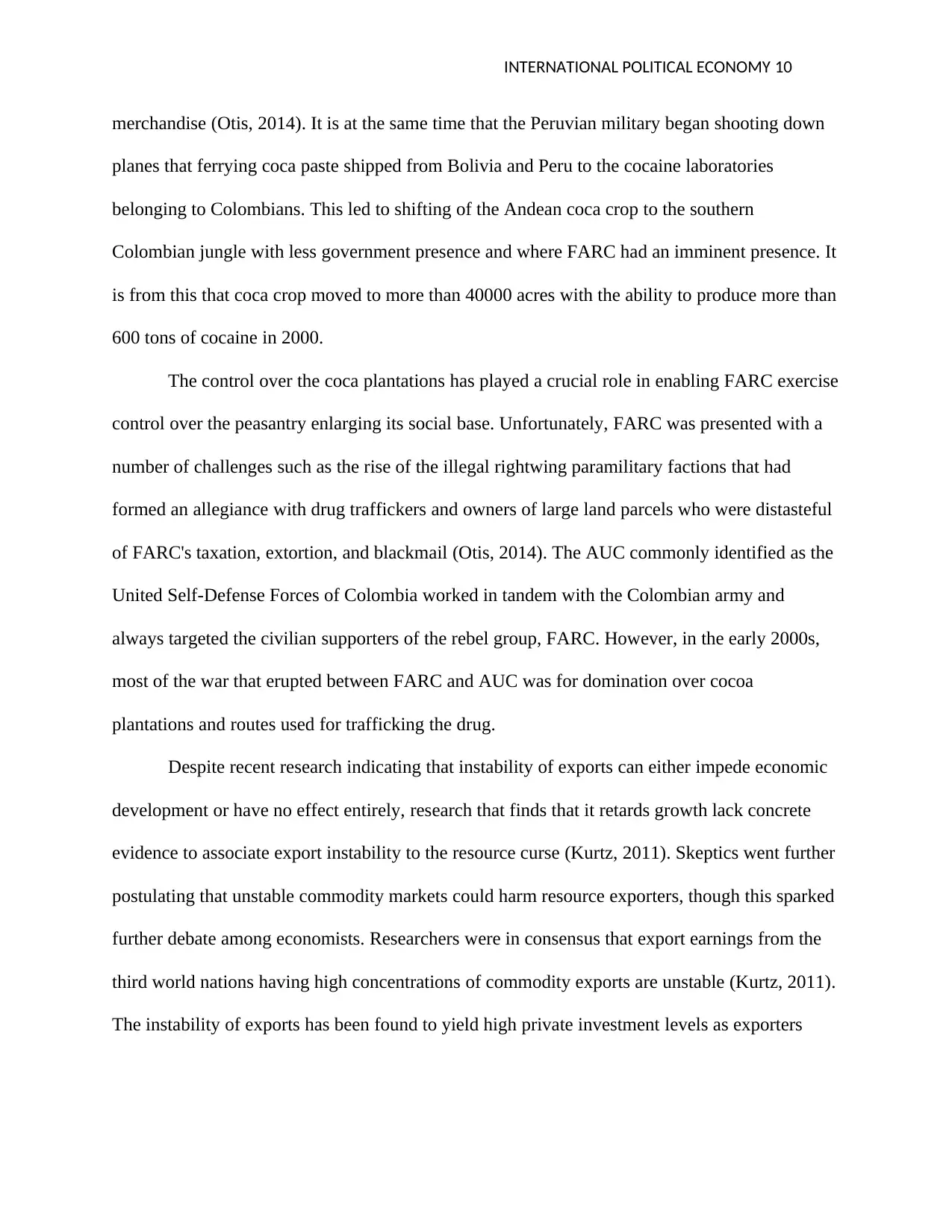
INTERNATIONAL POLITICAL ECONOMY 10
merchandise (Otis, 2014). It is at the same time that the Peruvian military began shooting down
planes that ferrying coca paste shipped from Bolivia and Peru to the cocaine laboratories
belonging to Colombians. This led to shifting of the Andean coca crop to the southern
Colombian jungle with less government presence and where FARC had an imminent presence. It
is from this that coca crop moved to more than 40000 acres with the ability to produce more than
600 tons of cocaine in 2000.
The control over the coca plantations has played a crucial role in enabling FARC exercise
control over the peasantry enlarging its social base. Unfortunately, FARC was presented with a
number of challenges such as the rise of the illegal rightwing paramilitary factions that had
formed an allegiance with drug traffickers and owners of large land parcels who were distasteful
of FARC's taxation, extortion, and blackmail (Otis, 2014). The AUC commonly identified as the
United Self-Defense Forces of Colombia worked in tandem with the Colombian army and
always targeted the civilian supporters of the rebel group, FARC. However, in the early 2000s,
most of the war that erupted between FARC and AUC was for domination over cocoa
plantations and routes used for trafficking the drug.
Despite recent research indicating that instability of exports can either impede economic
development or have no effect entirely, research that finds that it retards growth lack concrete
evidence to associate export instability to the resource curse (Kurtz, 2011). Skeptics went further
postulating that unstable commodity markets could harm resource exporters, though this sparked
further debate among economists. Researchers were in consensus that export earnings from the
third world nations having high concentrations of commodity exports are unstable (Kurtz, 2011).
The instability of exports has been found to yield high private investment levels as exporters
merchandise (Otis, 2014). It is at the same time that the Peruvian military began shooting down
planes that ferrying coca paste shipped from Bolivia and Peru to the cocaine laboratories
belonging to Colombians. This led to shifting of the Andean coca crop to the southern
Colombian jungle with less government presence and where FARC had an imminent presence. It
is from this that coca crop moved to more than 40000 acres with the ability to produce more than
600 tons of cocaine in 2000.
The control over the coca plantations has played a crucial role in enabling FARC exercise
control over the peasantry enlarging its social base. Unfortunately, FARC was presented with a
number of challenges such as the rise of the illegal rightwing paramilitary factions that had
formed an allegiance with drug traffickers and owners of large land parcels who were distasteful
of FARC's taxation, extortion, and blackmail (Otis, 2014). The AUC commonly identified as the
United Self-Defense Forces of Colombia worked in tandem with the Colombian army and
always targeted the civilian supporters of the rebel group, FARC. However, in the early 2000s,
most of the war that erupted between FARC and AUC was for domination over cocoa
plantations and routes used for trafficking the drug.
Despite recent research indicating that instability of exports can either impede economic
development or have no effect entirely, research that finds that it retards growth lack concrete
evidence to associate export instability to the resource curse (Kurtz, 2011). Skeptics went further
postulating that unstable commodity markets could harm resource exporters, though this sparked
further debate among economists. Researchers were in consensus that export earnings from the
third world nations having high concentrations of commodity exports are unstable (Kurtz, 2011).
The instability of exports has been found to yield high private investment levels as exporters
Paraphrase This Document
Need a fresh take? Get an instant paraphrase of this document with our AI Paraphraser
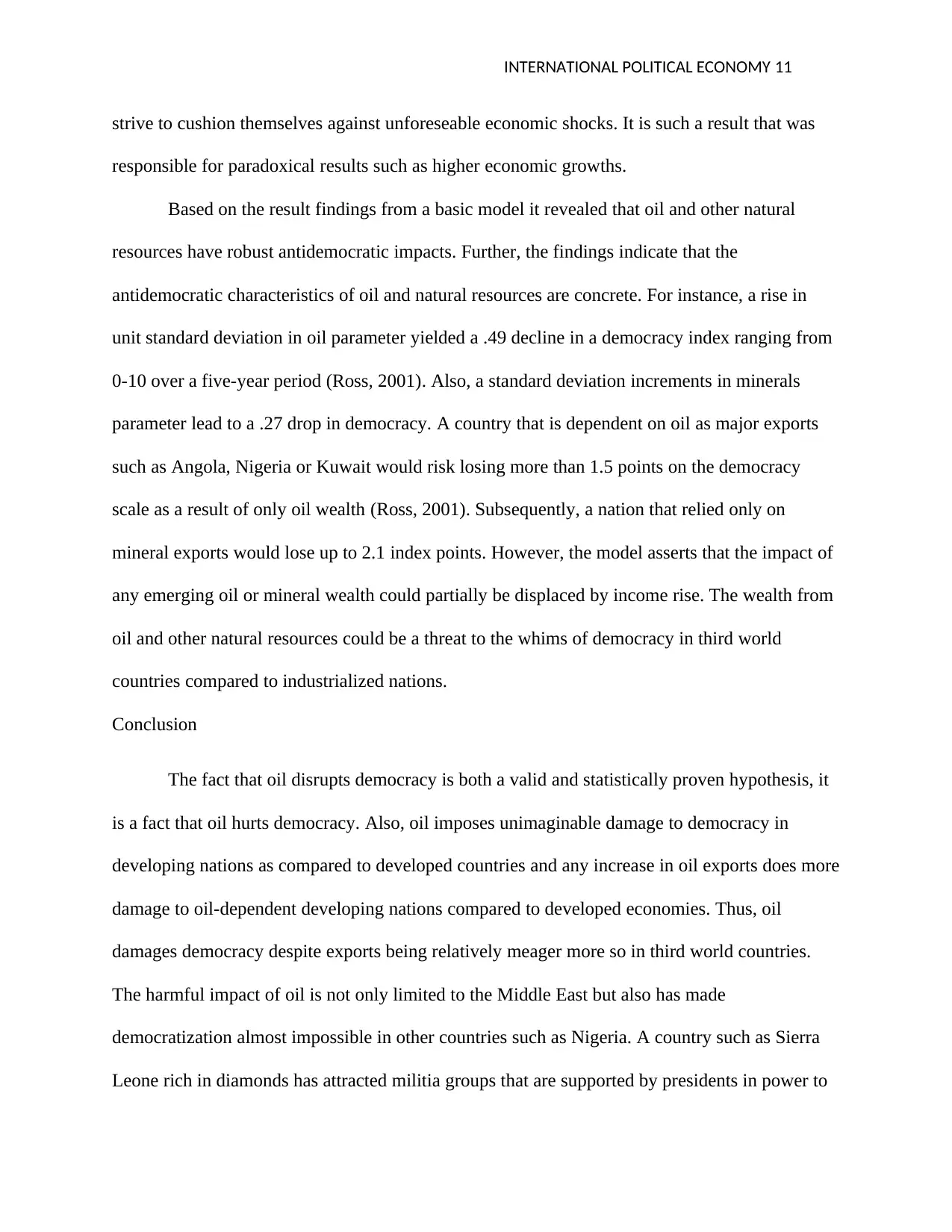
INTERNATIONAL POLITICAL ECONOMY 11
strive to cushion themselves against unforeseable economic shocks. It is such a result that was
responsible for paradoxical results such as higher economic growths.
Based on the result findings from a basic model it revealed that oil and other natural
resources have robust antidemocratic impacts. Further, the findings indicate that the
antidemocratic characteristics of oil and natural resources are concrete. For instance, a rise in
unit standard deviation in oil parameter yielded a .49 decline in a democracy index ranging from
0-10 over a five-year period (Ross, 2001). Also, a standard deviation increments in minerals
parameter lead to a .27 drop in democracy. A country that is dependent on oil as major exports
such as Angola, Nigeria or Kuwait would risk losing more than 1.5 points on the democracy
scale as a result of only oil wealth (Ross, 2001). Subsequently, a nation that relied only on
mineral exports would lose up to 2.1 index points. However, the model asserts that the impact of
any emerging oil or mineral wealth could partially be displaced by income rise. The wealth from
oil and other natural resources could be a threat to the whims of democracy in third world
countries compared to industrialized nations.
Conclusion
The fact that oil disrupts democracy is both a valid and statistically proven hypothesis, it
is a fact that oil hurts democracy. Also, oil imposes unimaginable damage to democracy in
developing nations as compared to developed countries and any increase in oil exports does more
damage to oil-dependent developing nations compared to developed economies. Thus, oil
damages democracy despite exports being relatively meager more so in third world countries.
The harmful impact of oil is not only limited to the Middle East but also has made
democratization almost impossible in other countries such as Nigeria. A country such as Sierra
Leone rich in diamonds has attracted militia groups that are supported by presidents in power to
strive to cushion themselves against unforeseable economic shocks. It is such a result that was
responsible for paradoxical results such as higher economic growths.
Based on the result findings from a basic model it revealed that oil and other natural
resources have robust antidemocratic impacts. Further, the findings indicate that the
antidemocratic characteristics of oil and natural resources are concrete. For instance, a rise in
unit standard deviation in oil parameter yielded a .49 decline in a democracy index ranging from
0-10 over a five-year period (Ross, 2001). Also, a standard deviation increments in minerals
parameter lead to a .27 drop in democracy. A country that is dependent on oil as major exports
such as Angola, Nigeria or Kuwait would risk losing more than 1.5 points on the democracy
scale as a result of only oil wealth (Ross, 2001). Subsequently, a nation that relied only on
mineral exports would lose up to 2.1 index points. However, the model asserts that the impact of
any emerging oil or mineral wealth could partially be displaced by income rise. The wealth from
oil and other natural resources could be a threat to the whims of democracy in third world
countries compared to industrialized nations.
Conclusion
The fact that oil disrupts democracy is both a valid and statistically proven hypothesis, it
is a fact that oil hurts democracy. Also, oil imposes unimaginable damage to democracy in
developing nations as compared to developed countries and any increase in oil exports does more
damage to oil-dependent developing nations compared to developed economies. Thus, oil
damages democracy despite exports being relatively meager more so in third world countries.
The harmful impact of oil is not only limited to the Middle East but also has made
democratization almost impossible in other countries such as Nigeria. A country such as Sierra
Leone rich in diamonds has attracted militia groups that are supported by presidents in power to
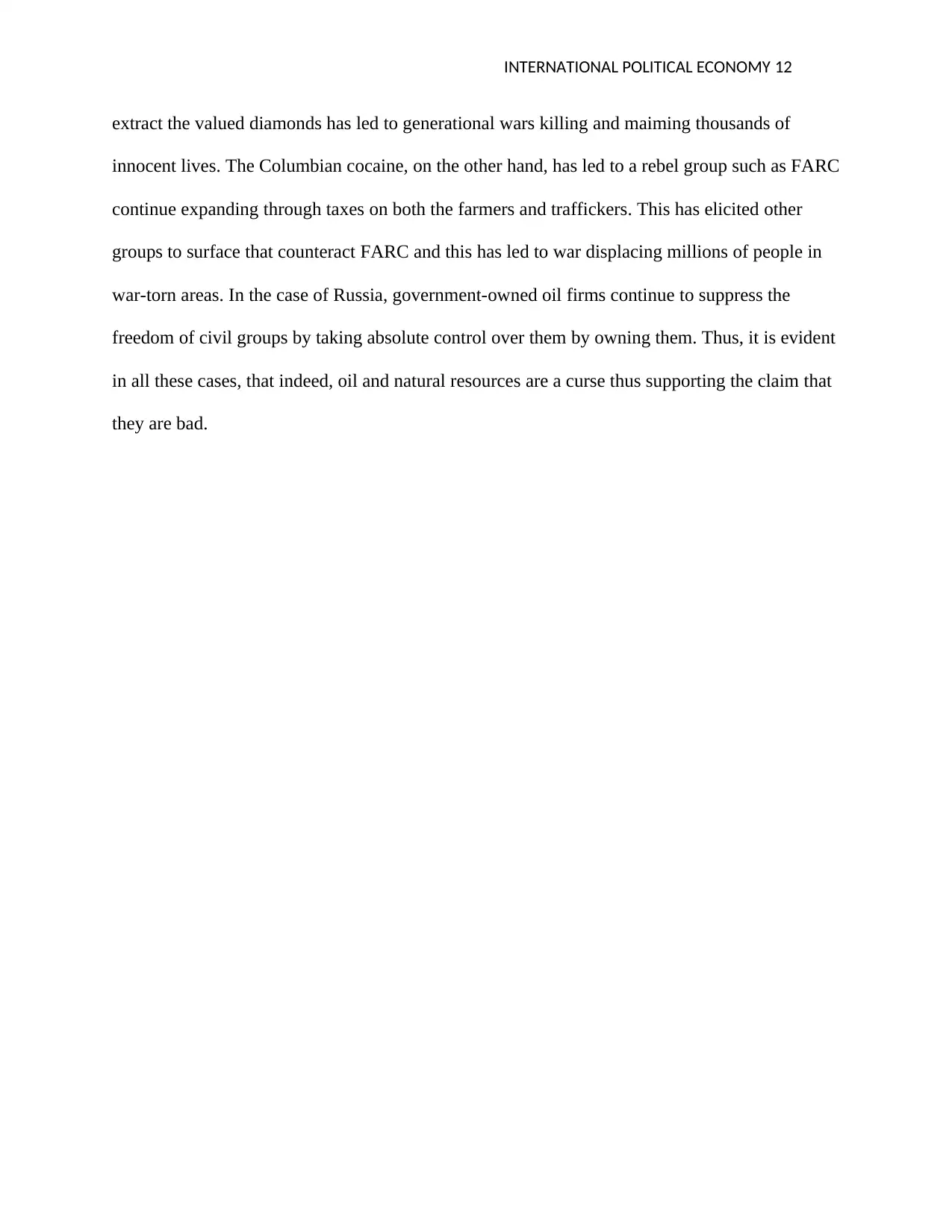
INTERNATIONAL POLITICAL ECONOMY 12
extract the valued diamonds has led to generational wars killing and maiming thousands of
innocent lives. The Columbian cocaine, on the other hand, has led to a rebel group such as FARC
continue expanding through taxes on both the farmers and traffickers. This has elicited other
groups to surface that counteract FARC and this has led to war displacing millions of people in
war-torn areas. In the case of Russia, government-owned oil firms continue to suppress the
freedom of civil groups by taking absolute control over them by owning them. Thus, it is evident
in all these cases, that indeed, oil and natural resources are a curse thus supporting the claim that
they are bad.
extract the valued diamonds has led to generational wars killing and maiming thousands of
innocent lives. The Columbian cocaine, on the other hand, has led to a rebel group such as FARC
continue expanding through taxes on both the farmers and traffickers. This has elicited other
groups to surface that counteract FARC and this has led to war displacing millions of people in
war-torn areas. In the case of Russia, government-owned oil firms continue to suppress the
freedom of civil groups by taking absolute control over them by owning them. Thus, it is evident
in all these cases, that indeed, oil and natural resources are a curse thus supporting the claim that
they are bad.
⊘ This is a preview!⊘
Do you want full access?
Subscribe today to unlock all pages.

Trusted by 1+ million students worldwide
1 out of 14
Your All-in-One AI-Powered Toolkit for Academic Success.
+13062052269
info@desklib.com
Available 24*7 on WhatsApp / Email
![[object Object]](/_next/static/media/star-bottom.7253800d.svg)
Unlock your academic potential
Copyright © 2020–2026 A2Z Services. All Rights Reserved. Developed and managed by ZUCOL.
